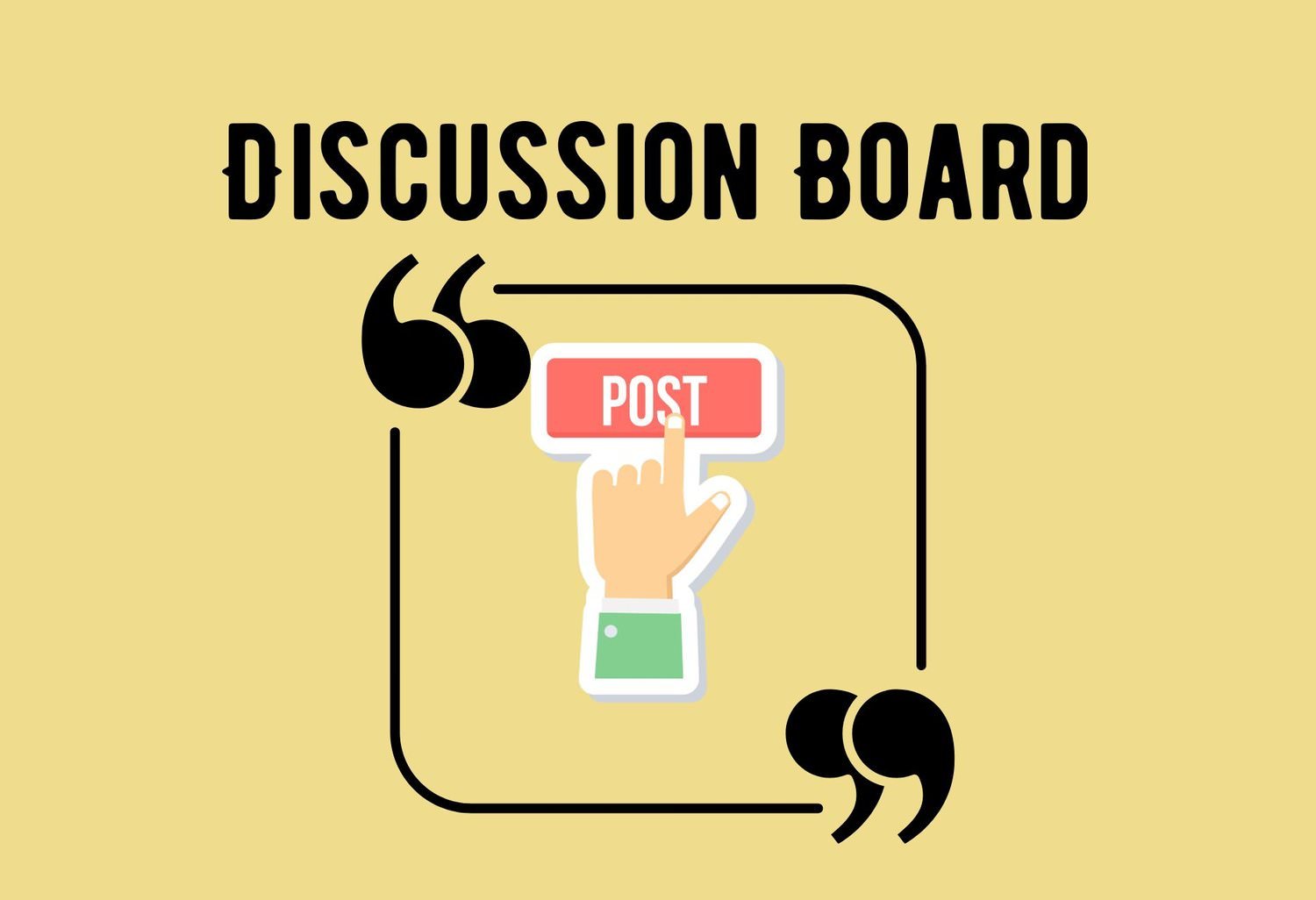Discussion posts FAQs (answers from a professor)
About the author
Hi there. I am the prolific professor with 15 years of experience teaching online and in-person. I have a graduate degree. I have a passion for education. But I’ve also worked in the professional world (outside of education) too. Thanks for visiting.
Students’ top 6 questions about discussion posts answered by a professor
Discussion posts in an online class can be intimidating. You might feel like your being judged by your peers or it might seem like a popularity contest.
You might hate discussion boards and think that discussions are useless and boring. Why on earth would a professor require them?
I taught college classes for 15 years and I have heard a lot of feedback from students about discussion boards. While I know lots of students dislike them, some appreciate them.
Discussion boards can add a lot of value to an online classroom. They keep students engaged, improve written communication skills and foster an online community.
But I know that it can be annoying to complete for students, but just know there is a method to the madness.
And I know students can have trouble completing these discussions, and if you need help from your professor, I have an entire article explaining how to get the best feedback ever.
But in this article, I am going to answer the top 6 questions I got from students about discussion boards and posts.
What are discussion boards?
Discussion boards are typically used in an online learning environment. The instructor will require students to answer a critical thinking question. The students can see other classmate’s posts and are usually encouraged to reply and engage with other students in the online community.
You have probably already posted to a discussion board before but if you haven’t, I will explain what these are in a little more detail.
The discussion question is posted in an online learning management system by an instructor. Students will then view the discussion question and should think critically before responding.
Then you type up a detailed response per the instructions.
Other students can then view your response. And usually they can reply. This depends on your professor’s settings. It is possible to disallow threaded replies so you might not be able to say something back to another student.
Again, this is usually completed for an online class in college.
Discussion posts are a great way to get students talking about the content and seeing what other classmates think.
Why do professors require discussion posts?
I know you are probably grumbling as you read this because most students don’t seem to think favorably about discussion questions.
And you want to know why you even need to do these. What is the purpose of discussion boards and posts anyway?
I will tell you why I required discussion posts and why other professors may require them.
When an online course is created, there is typically an internal review process by the college. And that review committee wants to see a variety of teaching methods and assessments.
This means that professors shouldn’t only measure students’ knowledge through quizzes. And they shouldn’t only have PowerPoints for lecture. They should be incorporating a variety of techniques to teach the material and assess students.
Think abut it. Would you want your knowledge to be tested with only one giant exam? Probably not.
By giving students multiple assignments, professors are likely increasing the odds that students will succeed.
So if a student is a terrible test taker, they at least have a chance at scoring well on writing assignments and discussion posts.
Another reason why a professor might require discussions is because it really helps students stay engaged and creates an online community.
Since you aren’t physically in class, you won’t be able to meet students and have class discussions. But these discussion boards allow just that. Now you have the best of both worlds. You have the flexibility of doing things online, but the connections with classmates through discussion boards.
The last reason why I see professors include discussions in an online class is because it helps students learn the information.
Students might actually learn better from their peers and by reading their posts, you are learning in the process.
It can be boring to read your professor’s PowerPoints the entire semester, but getting to read your classmate’s responses can make it more exciting and give you a change of pace.
Students’ frequently asked questions about discussion boards
No one responded to my discussion post, should I be offended?
If no one responds to your discussion post, you should not be offended. In fact, it could be a compliment. If your discussion post is thorough, other students might not have anything to say since your post said it all. Another consideration is that you might have posted at the very last minute (before the deadline) and other students didn’t have time to see your post and respond.
Before you start to worry about no one responding to your discussion post, you need to think about a few things first.
When did you post your reply?
If you posted your reply too late, it is possible that other students have already replied to someone else’s earlier post. If you want to get more replies on your posts, try and post as soon as possible. This way more students can see your post and have an opportunity to reply.
What is the length of your posts?
If you didn’t make a long enough post, students will have little to respond to. But if you make it too long, students might not want to spend the time reading it to reply. Just make sure you are meeting your professor’s requirements for length.
How many students are in the class?
If you have lots of students in your class, it’s possible students will have too many other opportunities to reply. And if students are seeing lots of other students reply to the same posts, they may follow the other students’ lead. I wouldn’t fret about not having any responses if the class is large. It would be hard for students to read everyone’s posts and reply.
Have you made any friends in the class?
Try and be more active in the online community. When someone responds to your discussion or even to a reply you made on their discussion, read it and thoughtfully reply back. This way more students see your name and know you are active in the online classroom. They may return the favor.
Are you replying to other students’ posts?
If you aren’t replying to other students posts, students might skip over your content too. It’s possible that they find other students’ posts who have replied to them over the semester. Try and reach out to more students via replies and up your game.
How to respond to another student’s discussion post?
To respond to another classmate’s discussion post, you need to read it first. When you are reading their original post, think about the things you learned that you didn’t know before. Then think about the things that you liked and didn’t like. You aren’t critiquing their post, but you are finding ways to further engage them scholarly. Or add something to their original thoughts.
After you have thought about what you learned, research it a bit more. Is there anything you can add to that discussion that they didn’t. Go a step further. Say something like, “From your post, I learned that insects have 6 legs. Upon further research, I also discovered that sow bugs are not considered insects and they have 14 legs.”
You can follow it up with more information. But you get the point. You are just adding on new information about something that you learned from their post. And providing something relevant that they might find interesting.
Another way you could reply is looking at what you didn’t like about the post and giving a professional and scholarly rebuttal. You aren’t trying to argue with them but you want to share some refuting information.
So, is there anything that might be incorrect? Research the topic and come up with a thorough response to help the student understand the material.
When you are replying to other students, make sure you have proper online etiquette. Sometimes when we write, it can come across a lot differently than an in person discussion.
The recipient can’t read your body language and may think your response was rude. Just make sure you are positive in your response and follow all the guidelines from your professor.
And pay special attention to any word count that is required.
Are discussion boards useless?
Discussion boards are not useless. In fact, discussion boards can foster an online community, help students learn the information from their peers, and give a variety of assessments for students to earn their grades.
Believe me when I say that there is a reason professors require discussion posts. It isn’t to annoy students either. They are there for a reason.
Students can really stay more engaged in the class by doing online discussions. If you only got online to take quizzes, the course could get really boring and you may have a hard time staying focused and excited about the class.
Also, a lot of students, and I mean a lot, don’t like to talk in front of the class, but they don’t mind writing a response to a discussion for other classmates to see.
This allows even the most introverted student to shine. It gives everyone an opportunity to share their thoughts.
Why students hate discussion boards?
I have heard from my readers and online communities that students hate discussion boards because they feel like other students might be judging them. And it can be hard to feel vulnerable.
Maybe you don’t like the idea of trying to impress your classmates through a discussion post. You put all this effort into writing this eloquent post and no one responds. It can be saddening.
Another reason why students might not like them is because they have to reply to other students. And if you are the first student to answer the question, you are going to have to remember to go back and respond once other students start answering too.
It is also possible that students dislike discussion boards because they don’t like to have to put a lot of effort into the course. It is one thing to take a quiz online, but to write a detailed discussion takes time.
Lastly, students may not like them because they don’t make good grades on them. If you aren’t scoring high, you probably despise them.
But don’t worry, I will give you the scoop to do better on discussion posts.
How to improve my discussion board posts?
If you want to get a good grade and improve your discussion posts, you need to make sure you review your professor’s rubric. You should also research the topic thoroughly. And read any corresponding materials first. Then write a detailed response, using your own words. And try to use a source to support your thoughts.
Even though I already detailed how to get good grades, I am going to quickly discuss it here too.
Before you answer the question, make sure you read every single piece of material that covers the topic. If you were supposed to read Chapter 4 in the textbook, read it. If you were supposed to watch a video, watch it.
Then go over the rubric. This is usually available from your professor and it outlines how the professor is going to grade the assignment. Make sure you know what to expect and what your professor is looking for.
After that, make an outline. You don’t want to rush and start typing right away. Make a quick list of things you want to cover.
Start researching. I would really try to use some outside resources to answer your question. This entirely depends on your professor, but look beyond your textbook. Is there some scholarly source you could use?
Type your answer in a Word document first. This way you don’t accidentally hit submit before you’re ready. And you typically have more spellcheck and grammar features.
Lastly, ask your professor for some assistance, if you need it. Don’t wonder if you’re doing it right and instead contact them and ask.
Finally, post your response. And start replying to other students’ posts. But make sure your replies are thoughtful. Don’t merely say something like, “Good job!” Make it more engaging. You’ll definitely stand out more by doing this.
There aren’t any posts yet on the discussion board
Sometimes there might not be any posts yet on the discussion board and you might be the very first person to respond. However, it could that your professor selected a setting that doesn’t allow you to see any other students’ responses until you have made your own post. This way you cannot cheat and see other students’ answers before you post your own response.
So, while you might be the very first person to answer the discussion, it’s possible that your professor has hidden all the other replies until you post your response.
If you DID post your response, and you still cannot SEE other students’ posts, you may have just been too early and your classmates haven’t posted yet. I know it can be frustrating if you have to reply to classmates but no one has posted yet. You will have to check back later, closer to the due date, and hope someone else posts soon.
Do professors actually read discussion posts?
Yes, professors will read discussion posts and every student’s response to other classmates if they are a graded assignment. If the assignment is not graded, professors may use their discretion and skip reading these discussion posts but that isn’t advised.
It is important for professors to read every single sentence when they are grading an assignment and that includes discussion posts. If they don’t read the posts, how can they adequately grade the assignment?
Even if the discussion post is ungraded, I think it is important for professors to review the discussion boards because there could be something inappropriate written by another student that should be moderated.
When I was a professor, I also took the role of a moderator on discussion posts. If a student was being disrespectful on a discussion board, it was my responsibility to deal with it.
So, yes, professors should be totally be reading every discussion board, but I am willing to bet that some professors don’t read all the discussion posts and that they may simply skim student’s responses and give them full credit.
I don’t see anything terribly wrong with skimming a post if there isn’t much required of the student like an opinionated discussion. But if there is a lot of research required, a professor should be reading it in detail.
Just like in other jobs, you will have varying professors. Some are going to work harder than others.
I know after reading this article that you have all you need to make a good grade on a discussion post. And you probably now realize why professors even require these in the first place.
I hope you hit it out of the park!
More posts you’ll love







